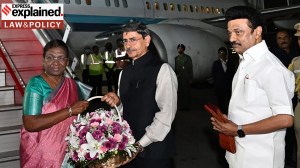Eco Survey unveils bold,ambitious agenda,now its over to Pranab
Arvind Virmani,Chief Economic Advisor,Ministry of Finance,said today in the Economic Survey 2008-09 that India can...
Arvind Virmani,Chief Economic Advisor,Ministry of Finance,said today in the Economic Survey 2008-09 that India can potentially grow at 7.75 per cent in 2009-10 and even enter the 8-9 per cent orbit in the coming years but attached two crucial riders a quick global recovery and implementation of critical policy reforms.
The bad news is there are no clear greenshoots of a global turnaround and the reforms the Survey talks about require more than just courage to implement.
But Virmanis wishlist,elaborated in the 400-odd pages of the Survey,presents one of the boldest and most comprehensive long-term reform agendas in recent years.
For starters,he wants Finance Minister Pranab Mukherjee to do away with cesses,surcharges,securities and commodities transaction taxes,dividend distribution and the fringe benefit taxes. But the need for resources to take care of big-ticket social programmes,that too in a slowdown year,will hold back Mukherjee from giving up any tax revenues when he unveils the Budget on Monday.
The Survey wants the government to limit LPG subsidy to 6-8 cylinders a year per household,decontrol diesel prices and eliminate kerosene subsidy by providing every rural household a solar cooker and a solar lantern. It advocates that producers be given the freedom to set prices of fertilizer formulations and convert fertilizer subsidy to a wholly farmer-user nutrient-related one. The political reluctance to do this can be gauged from a simple fact that the government has not hiked fertilizer prices since 2001,even when global crude oil prices touched $150 a barrel.
Some of the Surveys suggestions such as auctioning 3G spectrum,disinvestment of 5-10 per cent government stake in navratnas and listing unlisted PSUs to raise Rs 25,000 crore a year and implementation of a Goods and Services Tax are,however,consistent with the governments reform programme. Many others such as a hire and fire policy,FDI in multi-brand retail,hike in FDI limits in banks and greater entry of foreign banks,linking small saving instruments to government debt instruments,do not conform with the governments thinking.
Speaking to The Indian Express after the Survey was tabled in Parliament,Virmani admits he has taken a theoretical view on tax reforms that surcharge,cess and transaction taxes are bad. On the more controversial labour reforms,he said,the government has to make a choice whether it wants to grow the manufacturing sector slowly or the way China did by focusing on mass-scale production.
But,Virmani is clear that the economic stimulus a coordinated fiscal and monetary stimulus must continue through the year. Both the monetary and fiscal policy have to focus on generation of demand. The problem of low demand is still evident in the data, he said. Virmanis worse-case estimate of growth this fiscal is 6.25 per cent,and this too is contingent on good monsoons.
Photos


- 01
- 02
- 03
- 04
- 05





























